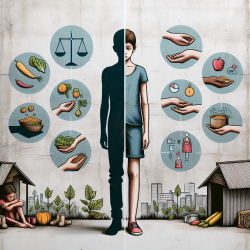Introduction
In the realm of special education, understanding the cognitive and neural mechanisms affected by early-life adversity is crucial. A recent study, "Altered Development of Hippocampus-Dependent Associative Learning Following Early-Life Adversity," sheds light on how childhood violence impacts associative learning and memory. This blog explores the implications of these findings for practitioners working with children who have experienced early-life adversity, offering insights into improving educational strategies and encouraging further research.
Understanding the Research
The study investigates how exposure to violence during childhood influences hippocampus-dependent associative learning. Researchers found that violence-exposed children exhibit broad associative memory difficulties that worsen with age. These difficulties are linked to reduced recruitment of the hippocampus and atypical recruitment of fronto-parietal regions during learning tasks. Interestingly, the study also highlights that these learning difficulties are specific to threat cues, such as angry faces, and remain consistent regardless of age.
Implications for Practitioners
For practitioners in special education, these findings emphasize the importance of understanding the unique learning challenges faced by children exposed to early-life adversity. Here are some strategies to consider:
- Individualized Learning Plans: Develop tailored educational plans that address the specific associative learning difficulties these children face. This may involve incorporating more visual aids or interactive activities that engage different sensory modalities.
- Emotional Support: Provide a supportive environment that acknowledges and addresses the emotional needs of violence-exposed children. This can help reduce anxiety and improve their ability to focus on learning tasks.
- Therapeutic Interventions: Collaborate with therapists to implement interventions that target the cognitive and emotional impacts of early-life adversity. Techniques such as cognitive-behavioral therapy can be beneficial in improving memory and learning outcomes.
Encouraging Further Research
While the study provides valuable insights, it also opens avenues for further research. Practitioners and researchers are encouraged to explore the following areas:
- Longitudinal Studies: Conduct long-term studies to track the development of associative learning abilities in children exposed to violence, examining how interventions can alter developmental trajectories.
- Broader Adversity Contexts: Investigate how different types of early-life adversity, beyond violence, affect hippocampus-dependent learning and memory. This could include socioeconomic factors, neglect, or emotional abuse.
- Neural Mechanisms: Explore the specific neural pathways and connectivity patterns that underlie associative learning difficulties in violence-exposed children, utilizing advanced neuroimaging techniques.
Conclusion
The research on altered hippocampus-dependent associative learning following early-life adversity provides critical insights for special education practitioners. By understanding the unique challenges faced by violence-exposed children, educators can develop more effective teaching strategies and support systems. Moreover, continued research in this field is essential to uncover the underlying mechanisms and develop interventions that can improve learning outcomes for affected children.
To read the original research paper, please follow this link: Altered development of hippocampus-dependent associative learning following early-life adversity.










